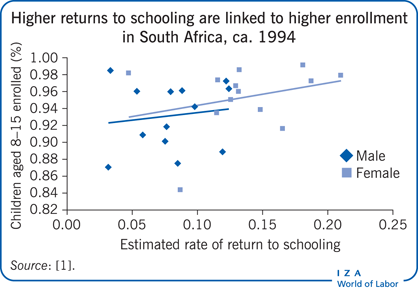Elevator pitch
Universal completion of secondary education by 2030 is among the targets set by the United Nations’ Sustainable Development Goals. Higher expected adult wages traced to schooling may play a major role in reaching this target as they are predicted to induce increased school enrollment for children whose families wish to optimally invest in their children’s future. However, low incomes and the obligation to meet immediate needs may forestall such investment. Studies suggest that school enrollment in developing countries is positively correlated with higher expected future wages, but poor families continue to under-enroll their children.

Key findings
Pros
Higher wages currently associated with higher levels of schooling appear to shape expectations about future wages and are linked to higher rates of school enrollment among children.
Income supplements to poor households increase children’s school enrollment, in part because they relax day-to-day liquidity and income constraints.
The relevance of schooling to the type of work the children may expect to do as adults likely affects the relationship between returns to schooling and school enrollment.
Cons
The complete labor market payoff to schooling is still debatable: it may include higher wages, better employment prospects, and/or access to formal-sector employment.
Income supplements tied to school enrollment appear to have a larger effect on enrollment than unconditional supplements; however, conditional supplements may encourage schooling at the expense of other spending options that have higher payoffs in terms of a child’s overall well-being.
There is little consensus about what inputs into schooling yield improved educational outcomes, which would in turn lead to higher expected adult returns to schooling.